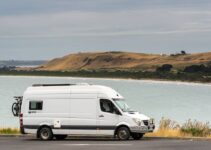A campervan propane system is one of the most dreaded parts of any van build. We’ll give you the confidence to incorporate propane into your camper conversion!
When you are living in a van and have the opportunity to camp in the middle of the mountains or out in the desert, nothing beats having the ability to take a hot shower. Well, maybe having the ability to turn the heat on during cold nights, cook a meal on your stove and keep your food ice cold without having to think about it.
All of these things are possible when you plumb propane into your campervan. But just like your van’s electrical system and water system, you have options for how advanced you would like to make your propane system.
From a bare-bones setup with a portable tank and minimal appliances to a robust system with a larger mounted tank and every appliance that gives you the same comfort and convenience of home, you have a lot of choices to make.
We appreciate a good propane system. And after we’ve covered all of the necessities – hot water, cooking, refrigeration and heating – there’s even room in a good system for extras, like an option to add an outdoor grill or propane fire pit.
Without further delay, let’s get into the basics of understanding what considerations you need to take when designing and installing a propane system in your campervan.
DISCLAIMER: Building a propane system in your campervan can be intimidating. And with propane, it can potentially be deadly. We definitely recommend that you consult professionals for anything you do not fully understand or need help with on the installation. This post is intended to give you the outline and basic guidelines for how your propane system works, what components you need to consider including in your setup and the basics of how to install these components. It is not intended to be a guide or installation manual.
An Overview of A Campervan Propane System
Before we cover the basics of a camper van propane system we want to go through what the most robust propane setup may look like inside a van. From there you can determine which components you may or may not want to include.
Although we will cover each of these components in more detail below, these are the different appliances that you will want to consider when planning your camper van propane system.
- Propane tank (fixed or portable)
- Stove and/or oven
- Water Heater
- Furnace/Heater
- Refrigerator
- LP/CO/Smoke Alarm(s)
- Portable fire pit and/or outdoor grill (optional)
How Does Propane Work In A Campervan?
Propane is stored inside a cylinder or tank that you can mount in a variety of options. It is liquid inside the tank because it is under high pressure.
If released at that pressure it would be dangerous and most, if not all, of your propane appliances, would not be able to function safely if at all. So you will have a two-stage regulator that reduces the pressure released to travel through a gas line to your different appliances.
You can split off the gas line to power multiple devices at once. Each appliance may have an additional internal regulator to further reduce the pressure if needed.
You open the manual valve by twisting it clockwise, which then allows propane to flow through the two-stage regulator and throughout your system to any device that would require it. You can also close the valve to ensure that propane does not enter the system unintentionally.
In some cases, such as through highway tunnels, you may be required to close the valve plumbing to prevent an explosion in the event of an accident.
Aside from the copper pipes and flare fittings, you will use during your propane plumbing you will only need a propane tank and regulator to connect your appliances together.
Propane Tank
Your entire propane system hinges on two decisions that you make concerning your propane tank. First, do you want to go with a portable propane tank(s) or with a mounted tank? Second, how much propane do you want to store?
Portable Propane Tanks
Portable propane tanks can take the form of tanks of various sizes. From the 1-pound green propane cylinder most familiar to backpackers to the full-size propane tank of five or ten-gallon capacity of the standard BBQ-style unit.
You have options when it comes to tank preference and you should carefully consider how much propane usage you plan throughout your whole system and which appliances you plan to install.
Clearly, the more appliances you have or plan to use on a regular basis, the larger the propane tank you should include in your system.
But when it comes to portable tanks, and propane tanks in general, you want to be sure that you secure the tank in a well-ventilated area with a working LP gas alarm within reasonable proximity.
In the event of an accident or emergency braking, you want to ensure that the propane tank does not take any impact that might jar the tank valve open or break them causing a propane leak.
Thus coupling an LP alarm nearby is essential for safeguarding against any gas leak. While we do not recommend portable propane tanks as your sole fuel source due to the safety implications of not having a proper propane tank compartment, they are great options under the following circumstances:
- You only have an outdoor stove or cooktop
- You aren’t interested in, or have alternative ways to, heat water, cool your food and heat your van
- You don’t use much propane
If any of these situations apply to you, it might be worthwhile to consider a portable propane cylinder that you can safely secure in a propane locker but quickly detach to refill as often as necessary.
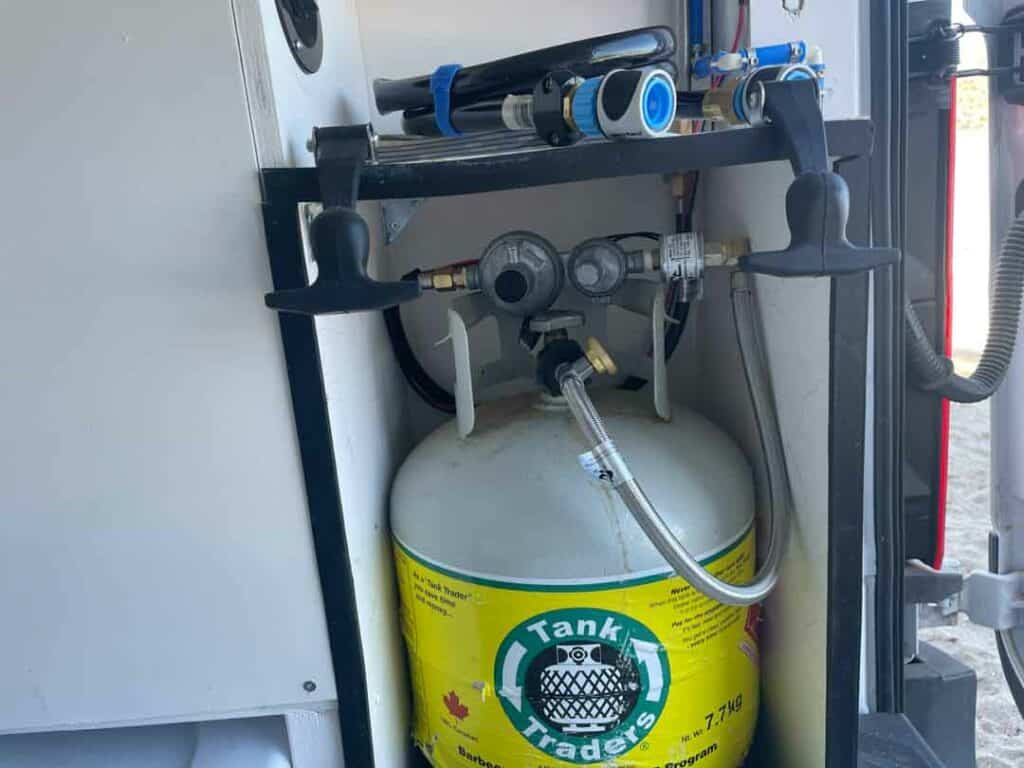
Mounted Propane Tanks
A mounted propane tank is advantageous to any camper van propane setup because they are larger, more secure and can provide lots of use before they need to be refilled. Tanks can range up to 15 gallons or more, which would last several weeks if not months under normal use.
And depending on which van you choose, you can find under van tanks for secure fitting that is conveniently out of the way.
Larger mounted tanks will also allow you to develop more complex propane plumbing inside your van that will allow you to install any kind of propane appliance to make your van life more comfortable and convenient on the road.
We are big fans of underframe tanks that fit under the van conveniently out of the way of other features of your van build.
Depending on which van you choose to convert, you can find great under-frame tanks that can be positioned out of the way of road and tire splatter.
Further, there is a unique regulator and hose arrangement for whichever option you choose where you can extend the gas connection to a convenient location for filling an empty cylinder.
The takeaway: A propane tank is essential to many facets of van life. And while you can skimp on the bare bones tank setup, it is likely worth the investment of time and money in installing a mounted tank that can hold more propane for you to use in numerous applications.
Propane Stove and/or Oven
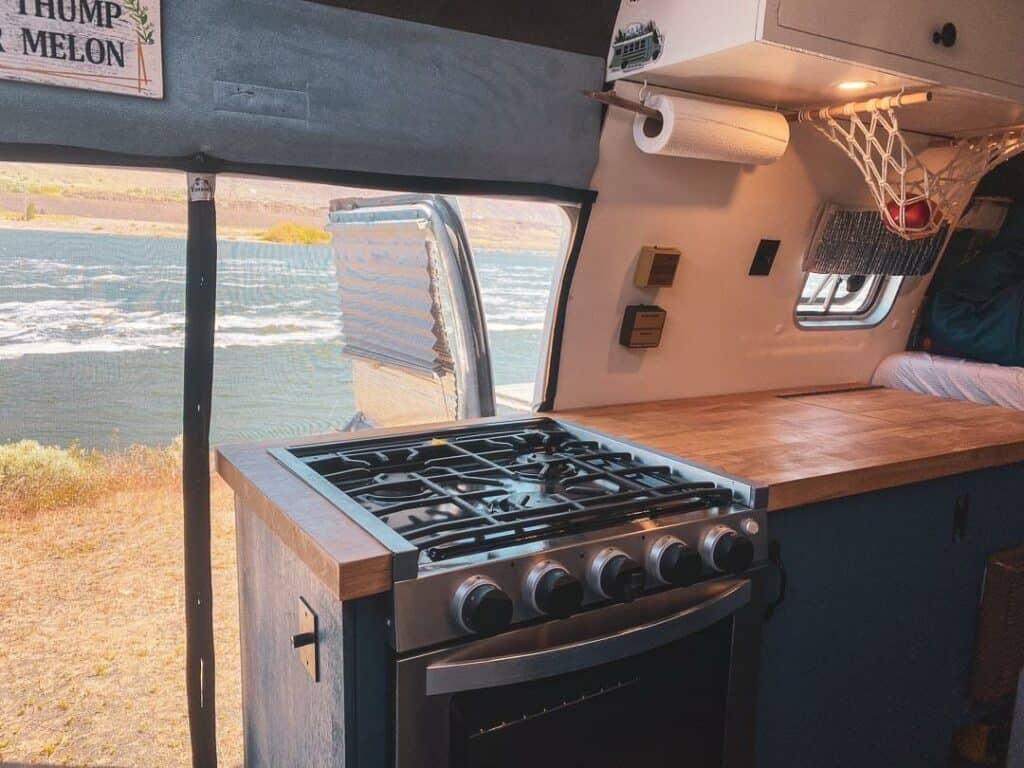
Cooking your own meals is part of van life. Most of us prepare our own meals not only to save on our budget but also to remain healthy and to be able to cook and enjoy a meal in remote and beautiful places where we camp.
The choice of what campervan propane stove and/or oven is best for you is entirely a matter of personal preference. There are lots of options out there and you can check out this post for our top recommendations.
But whether you choose to have a portable camping grill that you use to cook outdoors or just the stove installed inside your van, there’s virtually no way to cook on the road without a stove and/or oven.
And while there are electric induction options that run off your leisure batteries, the most common type of campervan stove will rely on liquid propane as its sole source of fuel.
Related: Be sure to read this post on our top recommended campervan stoves.
Water Heater
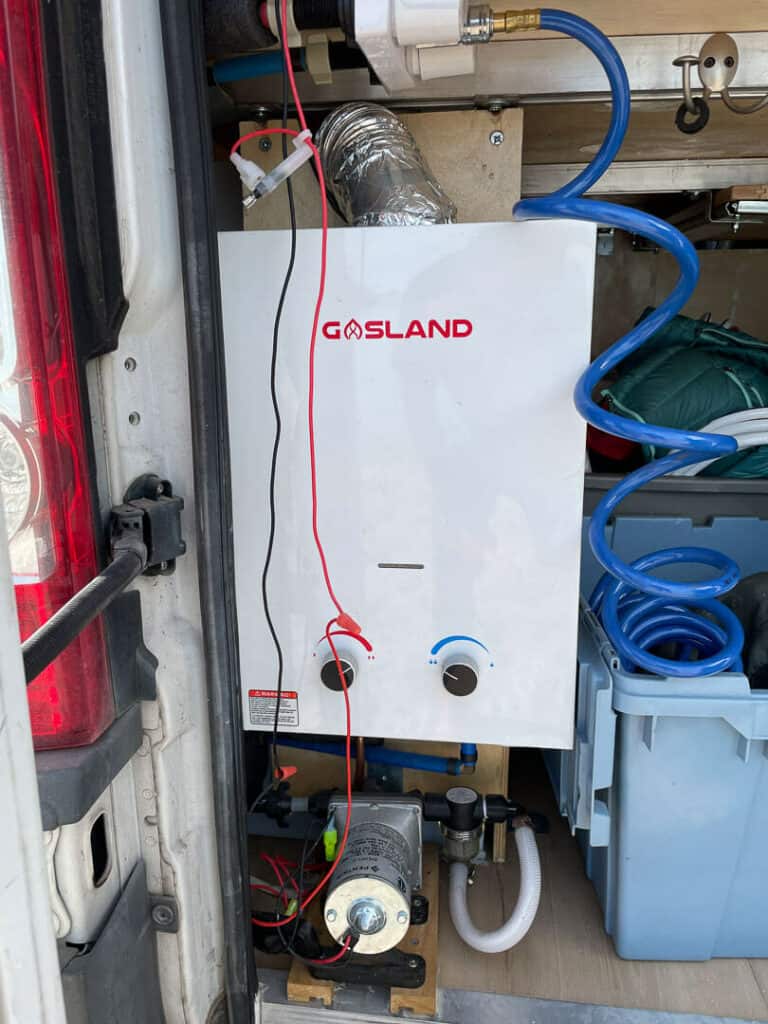
Hot water in van life is nice, but it is not essential. In the most basic of setups, a van dweller may wash his or her dishes in the same cold mountain stream in which they later bathe.
But if you do opt to add a hot water heater to your campervan water system we think that you will appreciate the convenience and warmth of on-demand hot water without having to shop around town for the closest free shower options.
There are options to heat water that does not include purchasing and installing a more expensive hot water heater. But we feel the best campervan hot water heater options will rely on propane gas to fuel them.
Whether you opt for tankless on-demand hot water heaters or bulkier RV-style water heaters is up to you. But we’d advise you to consider adding a hot water heater as part of your whole propane system.
Most often these heaters are installed at the rear of the van where propane plumbing can be done relatively easily from the propane cylinder.
Related: Check out our thorough buyer’s guide to campervan water heaters.
Furnace/Heater

Just as hot water could arguably be considered a luxury in van life, keeping warm in colder temperatures with the assistance of a heater or furnace may also not be considered a necessity.
After all, you can plan to bundle layers upon layers of clothes and blankets on you as a barebones solution. But a reasonable, albeit more expensive alternative, is to install a furnace or heater in your campervan.
There are options out there to fuel your heater from diesel, 110v electric or even from a portable 1 lb propane cylinder. But as heaters have massive propane usage, having a reliable and efficient propane heater is a great option if you plan to spend any amount of time where the cold could potentially be lethal if temperatures drop too low.
We think you’ll be grateful for adding a fixed propane heater to your van. But if you are on the fence about spending the additional money and going through the extra installation steps, check out this post on the best heating options for your campervan that may or may not rely on liquid propane.
We love the under-mount heaters that can be installed near the propane tank and the gas line for the propane plumbing is short and easy to connect. Instead of keeping the propane tank inside your van, it is stowed out of the way.
Related: Don’t miss our post on everything you need to know about campervan heater options.
Refrigerator
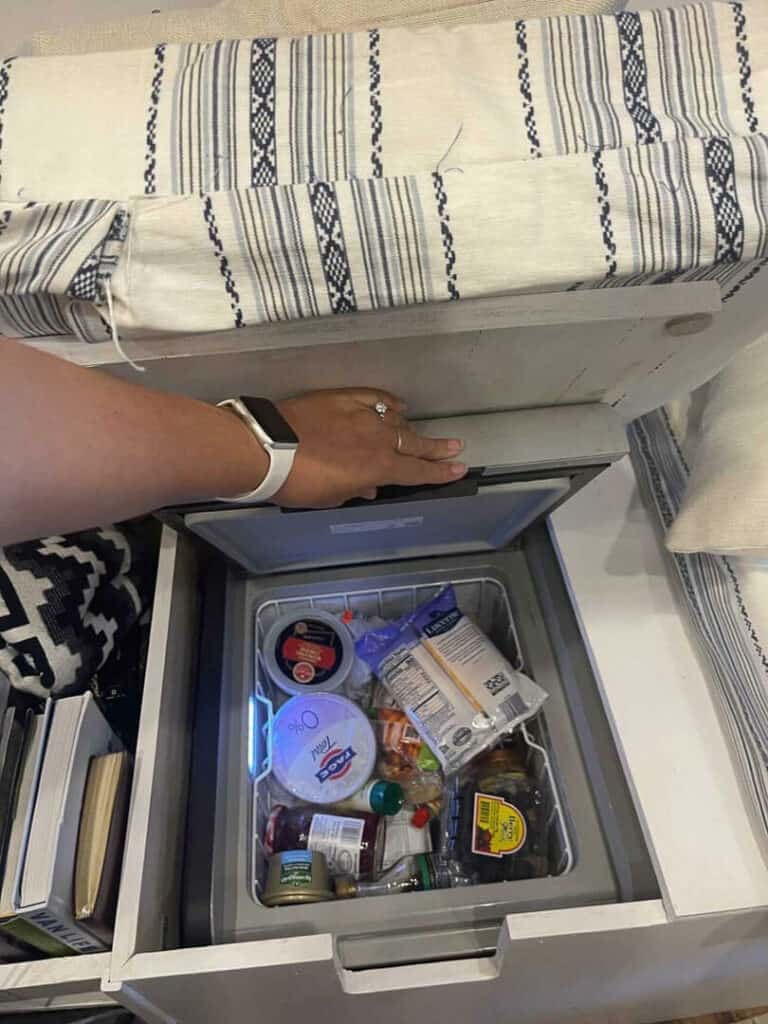
Van life, and general camping life, have created incredibly unique solutions for refrigerating food. So when it comes to refrigeration you have lots of options that may or may not involve needing propane gas.
In fact, most van lifers will opt to include portable or thermoelectric coolers that run off DC power from their battery bank instead of bulkier and more complex 2-way and 3-way refrigerators more common in larger RVs.
But if you prefer larger amounts of cold food products and/or you may want to not rely on one form of cooling, then investing in a larger RV-style refrigerator that runs on propane gas may not be far-fetched. These use minimal propane and are quite efficient.
And, unlike their battery-powered alternatives, you do not risk damaging the refrigerator or the battery bank when the power runs low. But you will need to have more space dedicated to your refrigerator and the outdoor venting it will need to operate.
Of all of the appliances on our list that you may want to connect to your van’s propane system, this is one you may opt for a non-propane solution.
Related: Check out our post on all of the best refrigerators for van life.
Liquid Propane / Carbon Monoxide / Smoke Alarm(s)
Regardless of whether you have a propane tank mounted in a propane storage compartment or keep the propane tank inside, and no matter which or how many propane appliances you connect to your whole propane system, you will want to install an LP alarm inside your campervan.
A leak in a gas line, tank valve or appliance can be catastrophic. In fact, propane gas is unscented in nature. But in order to sell propane, it must have an added scent to make it rather obnoxious and noticeable if you have a gas leak. But not all gas leaks are easily detected.
Having a manual propane detector alongside a propane alarm will allow you to worry less about the danger of using propane and enjoy the comforts it provides.
Propane gas is slightly heavier than air and so you will want to install the propane detector lower to the floor of your van. And there are great options out there where you could choose an alarm that is either hardwired into your power system or that runs on batteries.
We recommend the hardwired versions so that you don’t have to check the batteries. But you will want to test the alarm from time to time.
Additionally, look for alarms that double up with your LP alarm. Typically you will find options for a carbon monoxide detector and LP combination alarms.
But since incomplete combustion is involved in any propane appliance you choose, you will also want to make sure that you have a smoke alarm installed as well.
We recommend having both an LP/CO alarm as well as a CO/smoke alarm as this covers all of the safety bases when it comes to propane.
A note on propane safety: While we are just outlining the basic configurations for any propane system, we do not want to minimize the danger that propane appliances present. Every year a number of RVers experience catastrophic damage and loss of life due to faulty propane appliances and connections.
For this reason, we encourage you to do further research and/or consult professionals when it comes time to install these devices. We are intentionally not going into the details of what tools you need or how to install these appliances because we do not want to assume any responsibility for errors either in our advice or in your installation.
Portable fire pit and/or outdoor grill (optional)
Having covered the potential necessities for propane inside your van now is the point to leave room for a few fun options that add more comfort and/or convenience to van life.
If you consider in advance of your design whether you would like to carry other propane appliances, such as portable fire pits or outdoor grills or griddles, then you can plan to have a quick-connect adapter that will allow you to simply snap an extension hose from your van’s propane tank to your fire pit, grill or portable heater.
While not necessary, we’d advise you to consider this as it adds a whole new dimension to van life. You can enjoy a warm fire in places where firewood is either scarce or wood fires are not permitted, cook a meal outside instead of indoors, or even connect a portable heater to your van’s propane tank to be able to keep your feet warm while you enjoy a sunrise or sunset or late evening conversation with new friends.
You will just need to plumb an additional gas line from your propane regulator to the quick-release and consider an extended rubber hose of 10-15 feet to stay clear of your van.
Related: Here’s our ultimate buyer’s guide to portable propane fire pits.
Camper Van Propane Setup Options
Now that you have an idea of what kind of components you need to consider when designing and installing your van’s propane system, we want to give you a few ideas of different versions you could use as the framework for your van’s plumbing.
Bare Bones Setup
If you’re looking for the simplest way to design a propane system that saves you money and gets you out on the road sooner, then this is the framework from which you can build your system.
There are no bells and whistles. But you’re ok with the idea that convenience has its own cost that you are not willing to pay.
Key Features: In a barebones system in your van you may rely on a combination of 1 lb propane cylinders or those up to 5 gallon capacity like the standard BBQ cylinder. You don’t have a permanently installed stove or oven so you do most of your cooking outdoors on a camp stove (even on cold, windy or wet days!).
You also opt for alternative options in heating yourself on cold days, such as layering clothing and investing in a 12v heated blanket. And you’re exclusively relying on your robust battery bank to chill your food (or, even more barebones, simply adding ice to a cooler every 3-4 days).
And hot water, what’s that? You don’t mind driving from one Planet Fitness to another for a hot shower once a week or so.
- Portable propane tank (1 lb or larger)
- Portable camping stove
- Propane alarm
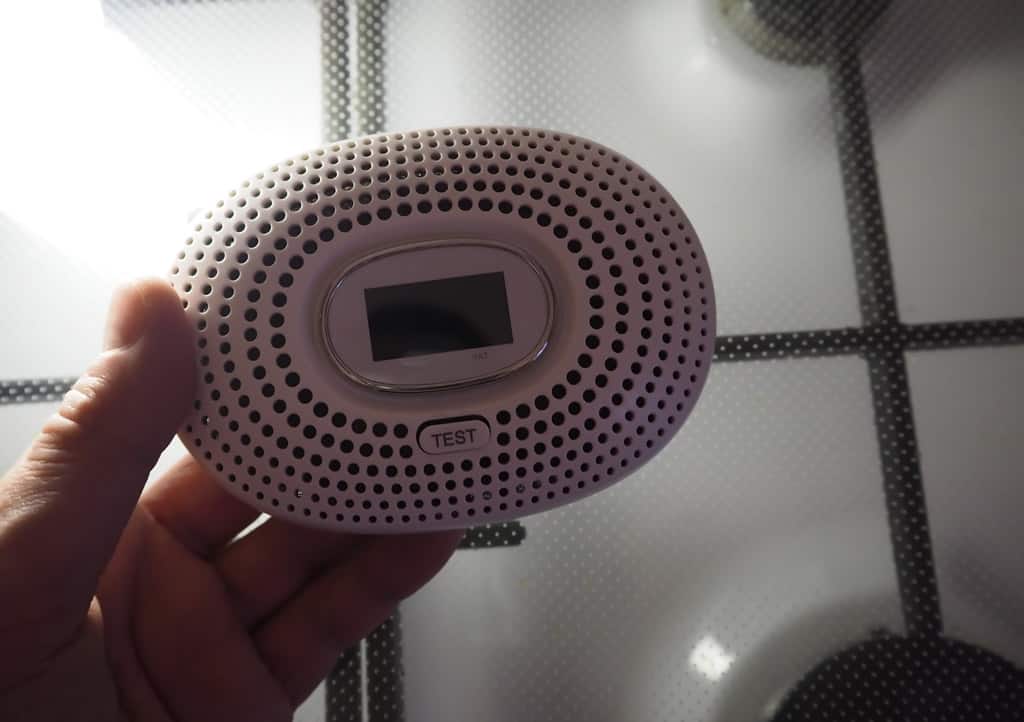
Most Common Campervan Propane Setup
This propane setup is one of the most common as it is a middle ground both on budget and in parts and plumbing. You’ll find that many other van lifers have similar, if not exact, setups because they will provide you the ability to meet your needs without going overboard.
Key features: The central part of your propane system is one of those under-van tanks that you mount beneath to the chassis or a larger tank tucked away neatly in the back of the van. This allows you to hold more propane so that you can plumb in a mounted stove and/or oven and an on-demand hot water heater.
You don’t plan to spend too much time in frigid temperatures so you can bypass a permanent furnace/heater and instead only have to rely on carrying one or two additional 1 lb propane tanks for your portable propane heater.
Plus you’re not using propane to cool your food as your thermoelectric cooler does more than enough since you’ve invested in a great battery bank.
- Fixed propane tank
- Stove and/or oven
- On-demand hot water heater
- Portable propane heater
- DC-powered refrigerator
- Propane alarm
The Ultimate Propane Setup
If you’re looking for a propane setup for your van that is robust and you can all but forget that it exists, this is the best framework for your build. You can expect to have all of the necessities and all of the luxuries with a little additional cost and installation.
Key features: Add some bells and whistles by installing a stove and/or oven, heater/furnace and on-demand hot water heater to your van. Because you’ve invested in a larger mounted tank that fits conveniently out of the way you are able to use each appliance for weeks if not months on end.
You are relying on your robust battery bank to power your refrigeration needs so you can afford to burn some extra propane every once and a while on a portable fire pit or outdoor grill connected to your tank through a quick-connect adaptor.
You have a dedicated propane compartment, either under the van or in a well-ventilated propane locker inside the van. And your propane alarm is centrally located and tested regularly.
- Fixed propane tank
- Stove and/or oven
- On-demand hot water heater
- Mounted heater/furnace
- DC-powered refrigerator
- Outdoor quick-release adaptor
- Propane alarm
Camper Van Propane FAQ
For everything else propane, here are the most frequently asked questions:
Can I use propane in a campervan?
Yes. Propane is an integral part of van life. You can opt for portable tanks that range from 1 lb to five-gallon capacity like Blue Rhino tanks you can swap out. Or you can choose a permanently mounted propane cylinder.
Whether you build a proper propane locker as a sealed compartment to the inside, but vented to the outside or mount your tank beneath your van is up to you. But you will want to consider using propane for various appliances every day in van life.
Is it safe to have a propane tank in a camper van?
Yes. But there are safety precautions you need to safely store and use propane. First, you should have a dedicated propane compartment or propane locker that acts as a sealed propane box to the inside of the van.
A vent tube or ventilated siding should allow gas space to diffuse in the air if you have a gas leak. You should know how all of your propane appliances work and allow for proper ventilation inside your van when using them.
And have an LP gas alarm inside your van in the event there is a leak. You could also invest in a manual detector if you suspect a leak may be occurring in a gas connection or appliance.
How long does propane last in van life?
This depends on how much propane you plan to use and which propane appliances you will use regularly. You can use propane to power gas barbecues and camping stoves outside of your van, run your refrigerator, furnace and hot water heater from propane.
A propane tank of five gallons or more should last weeks with normal use. But if you plan to use a hot water heater and/or furnace regularly this regular BBQ cylinder-sized tank may only last a few days to a week.
What does propane run in a camper?
The main appliances you can run in your camper or van is a refrigerator, stove, oven, furnace/heater and hot water heater. You could also have an external connection to fuel a portable grill or fire pit.
How do I fill my empty tank?
When it is time to refill an empty tank you will need to find a professional propane supplier. They will access your tank through your propane locker or propane compartment and connect the hose to your tank. Make sure that your propane valve is closed so that no appliances can use the propane as it is being filled.
When stored, propane is a liquid with high pressure inside the tank. There is a pressure relief valve that activates when filling an empty tank. If this safety relief valve is activated, the high pressure inside will vent to safe levels.
So a full tank is never completely full and you should never overfill the tank. There should always be some room in the full tank.
How can I find a leak in my propane system?
An additive is added to propane to give it an obnoxious odor that will typically indicate a leak. Additionally, you should have a propane alarm installed in a central place in your van. However, if you cannot physically smell propane and the alarm is blaring but sense there is a leak then you have a few options to find and fix the issue.
First, test your alarm to make sure it is not low in power. Sometimes a low battery will cause the alarm to sound. Likewise, a low or dead battery will not go off if there is a leak so be sure to test your alarm regularly.
Next, you can invest in a manual propane detector that you can hold around any gas connection in your system. Hover the want around each connection both inside and around the appliances and any propane plumbing outside the van. If there is a leak, the detector will sense it.
If you do not have a manual detector, you can also fill a squirt bottle with dish soap and water and spray it on each connection. If propane is leaking then the connection will bubble as the gas is released. This is not as scientific as a manual detector. However, it will help you solve the issue in a bind.
Typically a leak is found around a loose flare nut or flare fittings between appliances.
Wrapping Up
A propane system is an absolute must in any campervan. However, the degree to which you simplify or complicate it is up to your personal preferences on which and how many propane appliances you want to install in your van.
The ultimate campervan propane setup will account for both the heating of your living space and water and the cooling and cooking of your food. So long as you account for these aspects of van life, and for the safety considerations when using propane, you won’t go wrong with any propane setup you design!
This post may contain affiliate links. That means if you make a purchase a product we recommend using the links in this article, we may receive a small commission at no extra cost to you. We promise to use this pocket money to buy lots of coffee and fuel for the campervan to keep us enjoying #VanLife for just a little longer. We appreciate your support, and only recommend products we know and trust. Thank you friends!




